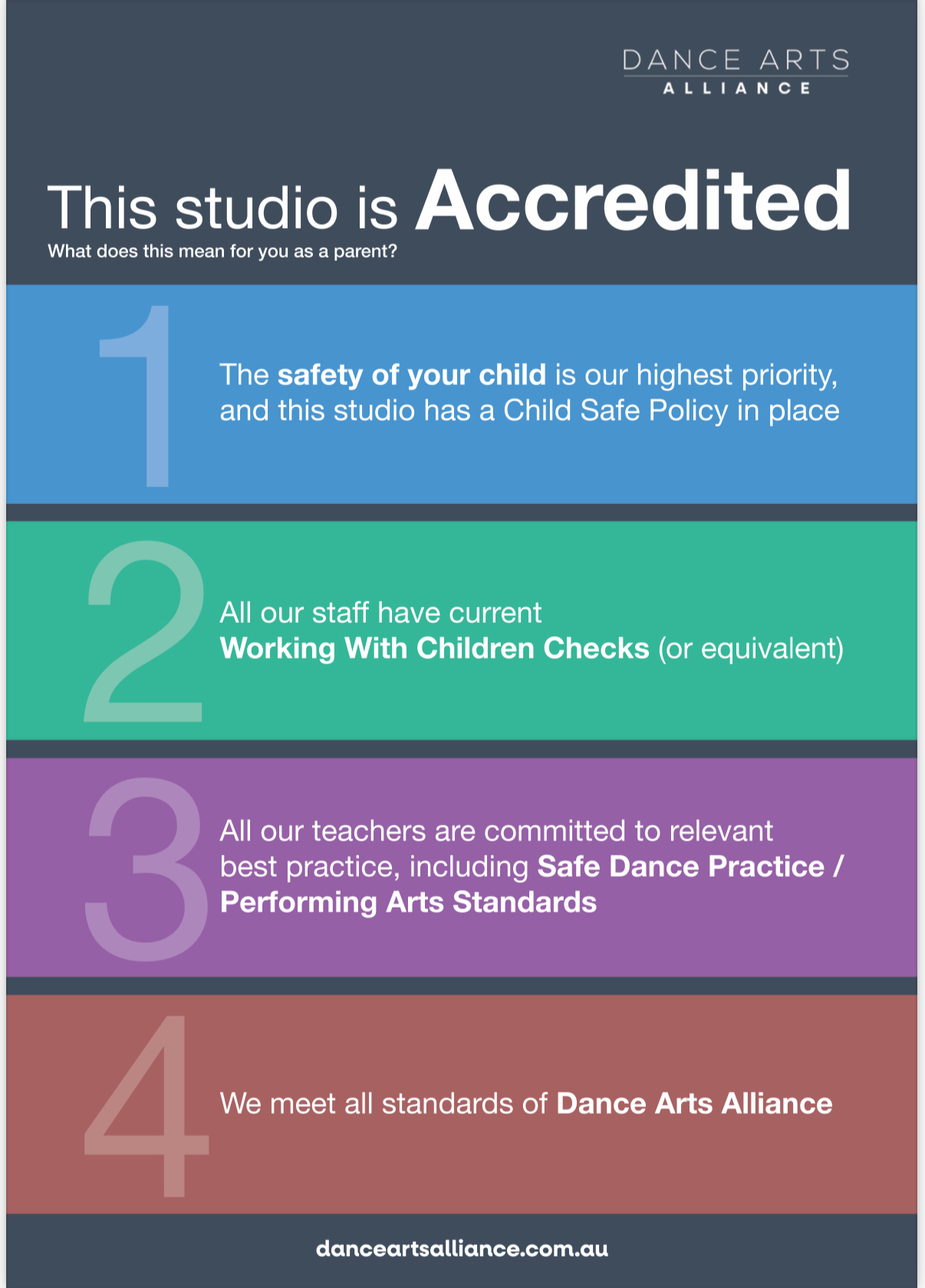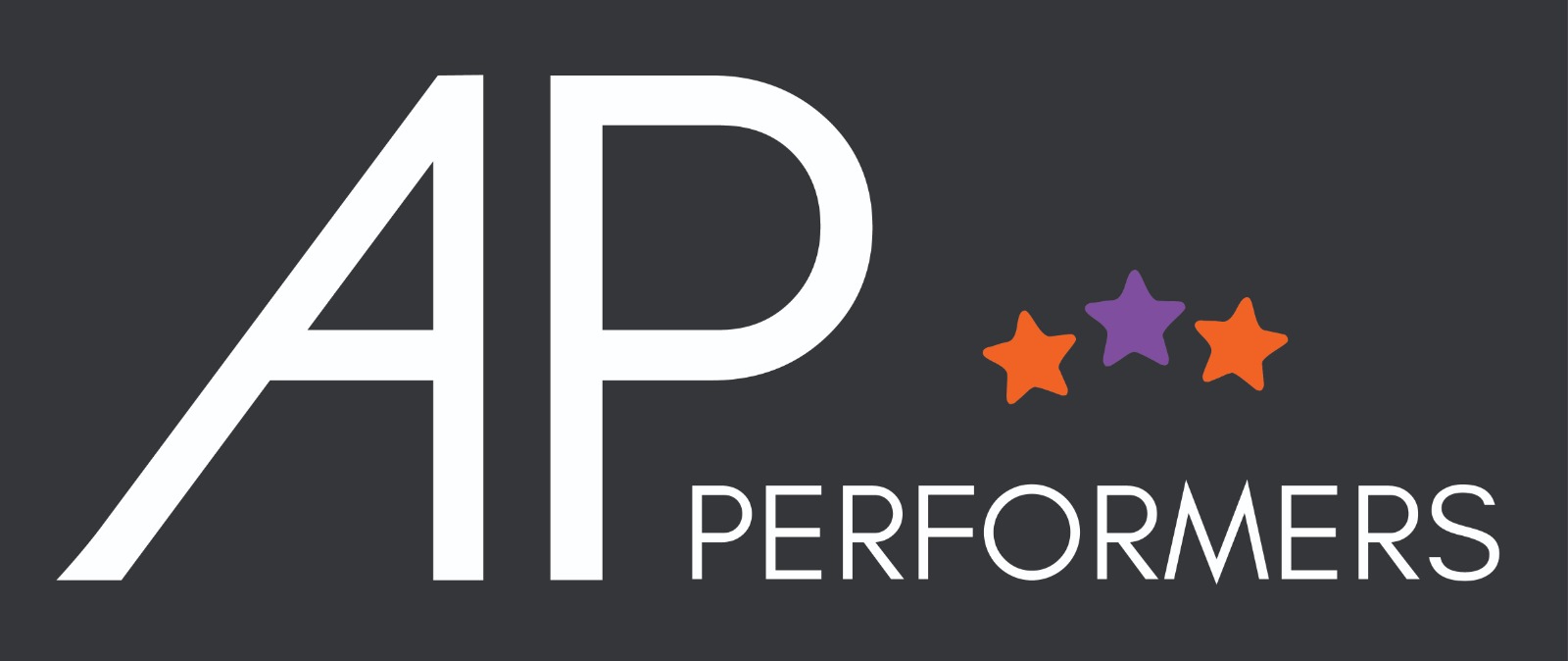AP Performers Policies


283 The Kingsway,
Caringbah 2229, NSW
ABN 88 929 745 118
AP Performers Child Protection Policy (Last Reviewed 22/1/25)
At AP Performers, the safety and protection of every child in our care are
paramount. This policy outlines our commitment to fostering a safe,
respectful, and supportive environment for all students.
1. Child Safety Principles
• Teachers will work in open and observable environments, avoiding private
one-on-one interactions with students.
• Staff will prioritise the welfare of each child, ensuring equal respect and
dignity for all.
• Open communication will be encouraged to ensure students feel safe to
express concerns or ask for help without fear of judgment.
• Age-appropriate, respectful, and safe learning experiences will be provided,
including regular hydration breaks.
• Teachers must obtain consent before using physical contact for
instructional purposes, ensuring it is necessary and respectful.
• Staff will be trained to recognise indicators of abuse or neglect and respond
appropriately.
• All teachers and staff must be aware of their obligation to report concerns
about a student’s well-being to the studio director or other designated
personnel.
2. Staff Conduct Expectations
To create a positive and safe environment for students, staff must adhere to
the following conduct expectations:
• Consent must be sought before physical contact is used to correct
technique or placement.
• Teachers will maintain professional boundaries, refraining from discussing
personal matters with students.
• Professional and respectful attire must be worn at all times while teaching.
• Interactions with children must remain appropriate and avoid any actions
that could be misunderstood.
• Personal phone use during lessons is strictly prohibited to ensure focus and
professionalism.
3. Creating a Safe Teaching Environment
• Teachers will ensure all surroundings are hazard-free and safe before
commencing a lesson.
• Appropriate music will be played, catering to the age and developmental
level of the class.
• Choreography will be carefully designed to suit the age, skill level, and
comfort of all students, avoiding moves or tricks that may cause distress.
4. Behaviour Expectations for Teachers
Teachers are required to model positive behaviour and avoid actions that
could harm students, including:
• Avoiding social or unrelated conversations with other staff during lessons.
• Refraining from making comments about a child’s appearance or clothing.
• Never engaging in physical or emotional intimidation, such as bringing a
child to tears or comparing them to peers in a negative manner.
• Maintaining professional distance, avoiding any form of inappropriate
games, touching, or comments.
5. Incident Reporting and Management
All staff are required to:
• Record and report any incidents or allegations involving a student promptly
and accurately.
• Maintain a secure and confidential system for documenting concerns.
• Follow mandatory reporting obligations, including reporting suspected
abuse or neglect to the studio director or local Child Protection Services.
6. Mandatory Reporting Obligations
Staff must report the following immediately to the studio director or
appropriate authorities:
• Accidental harm caused to a child.
• A child feeling uncomfortable or distressed due to staff actions or dance
movements.
• Any misunderstandings or misinterpretations of staff actions.
• Signs of abuse or neglect observed in a child’s behaviour or character.
• The studio director will evaluate the reported information to determine if it
meets the threshold for a child being at ROSH (risk of significant harm).
• To assist in this assessment, the Mandatory Reporter Guide (MRG) should
be utilised.
• Making a Report:
• If the situation is assessed as meeting the ROSH criteria, a report must be
made to the NSW Child Protection Helpline.
• Reports can be submitted through:
• eReport: Via the ChildStory Reporter website.
• Phone: By calling the Child Protection Helpline at 13 21 11.
• Information to Include in the Report:
• When making a report, provide detailed information, including:
• Child’s full name, age, and address.
• Description of the concerns and any specific incidents.
• Any known family background or context.
• Details of any immediate actions taken.
• For comprehensive guidance on the information required, refer to the
Information Needed to Make a Report resource.
• Confidentiality and Legal Protections:
• The identity of individuals making reports is protected under NSW law.
• Reports are confidential, and the reporter’s identity cannot be disclosed
without consent, except in specific circumstances outlined by legislation.
• Ongoing Support and Monitoring:
• After a report is made, the studio will continue to support the child and
monitor the situation, collaborating with relevant authorities as necessary.
7. Social Media and Privacy
• Written consent from parents/guardians is required before featuring
students in social media posts or promotional materials.
• Teachers are prohibited from tagging students in private social media
accounts, initiating private conversations online, or discussing private
matters on social platforms.
• All shared content will reflect the studio’s values, avoiding any form of
exploitation or inappropriate representation.
8. Anti-Bullying and Inclusion
• AP Performers promotes a culture of inclusion, respect, and kindness.
• Bullying or discriminatory behaviour will not be tolerated and will be
addressed immediately.
9. Parental Engagement and Conduct
• Parents are required to provide updated emergency contact details and
relevant information about their child’s needs.
• Open communication with parents is encouraged to collaboratively address
any concerns or feedback.
• Parents are expected to model respectful and supportive behaviour when
interacting with staff, students, and other community members.
• Communication with staff and management must be constructive and free
from aggression or disrespect.
• Any concerns regarding the studio, its policies, or teaching methods should
be raised directly with the studio director in a professional manner.
• Parents must refrain from sharing negative or defamatory comments about
the studio, staff, or students on social media or in public settings.
• Inappropriate behaviour or conduct by parents that disrupts the studio
environment may result in restricted access to studio events or other
necessary measures to maintain a positive and safe atmosphere.
10. Recruitment and Training
• All staff and volunteers must hold a valid Working With Children Check
(WWCC) and provide documentation before commencing duties.
• Training sessions will be conducted to ensure staff are aware of child
protection principles and reporting procedures.
11. Drop-Off and Pick-Up Procedures
• Students must be dropped off and picked up by a parent, guardian, or an
approved adult as indicated on the enrolment form or as communicated to
the studio in advance.
• Parents/guardians are required to provide a list of authorised individuals
who may collect their child. Any changes to this list must be communicated
in writing to the studio.
• Students will not be released to individuals not listed as an approved adult
unless prior notification has been provided by the parent or guardian.
• Designated waiting areas will be clearly marked, and parents or guardians
are encouraged to arrive promptly at the end of each class to minimise
waiting time.
• If a student is not collected within 15 minutes of the class finishing, staff will
contact the parent or guardian to confirm arrangements.
• Parents and guardians are reminded to prioritise safety during drop-off and
pick-up, adhering to traffic rules and using designated parking or waiting
zones.
• For students walking or travelling independently, written permission must
be provided by the parent or guardian, and arrangements must be pre-
approved by the studio.
12. Fees Policy
• Fees must be paid on time according to the payment cycle selected at
enrolment (weekly, fortnightly, or by term).
• Payment due dates will be clearly communicated, and it is the responsibility
of the parent or guardian to ensure fees are settled on or before the due
date.
• Accounts that fall into arrears will be subject to follow-up communication
and potential suspension of participation until the account is brought up to
date.
• Ongoing arrears may result in withdrawal of the student from classes until
the outstanding balance is cleared.
• Payment of fees is required regardless of attendance. Missed classes, for
any reason, do not exempt the parent or guardian from their obligation to
pay for the enrolled period.
• Fees are non-refundable except in cases at the discretion of studio
management.
• Credits for missed classes are not provided; however, make-up classes
may be arranged where possible.
• Payments can be made via bank transfer, credit/debit card, or direct debit,
as per the studio’s accepted methods.
• Receipts will be issued upon request.
13. Policy Updates and Reviews
• This policy will be reviewed regularly to ensure compliance with best
practices, legal requirements, and stakeholder feedback.

